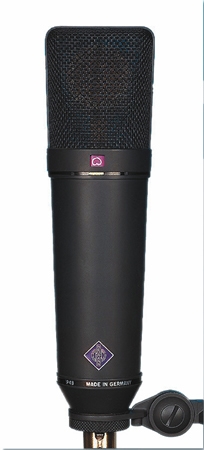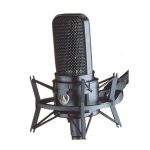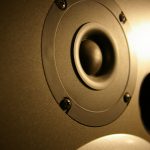What’s the best microphone for a voiceover artist? Can you only be taken seriously if you’ve got a Neumann? Do VO’s need a U87?
 If you’ve wondered about a career as a voice artist and done any research into the area then you’ve bound to have come across the name of German microphone manufacturer Neumann. In particular it’s likely that you will have seen the U87 cited as “the” mic to have for voiceover. It’s large diaphragm condenser mic – and personally I think you must have a condenser rather than a dynamic mic for voiceover work – but does it have to be a Neumann?
If you’ve wondered about a career as a voice artist and done any research into the area then you’ve bound to have come across the name of German microphone manufacturer Neumann. In particular it’s likely that you will have seen the U87 cited as “the” mic to have for voiceover. It’s large diaphragm condenser mic – and personally I think you must have a condenser rather than a dynamic mic for voiceover work – but does it have to be a Neumann?
I invested in a Neumann U87 earlier this year for my dvoicebox studio (see part 1 of this blog). I’ll be honest in saying that I thought it was important for a studio specialising in spoken word and voice over projects to have a Neumann microphone. As a voice artist going to a spoken word studio I would have been surprised and a little disappointed if it didn’t have at least one mic made by them – it’s expected. But is that the same as saying you need to have a Neumann microphone to work as a voice artist? I’m not sure it is.
So for comparison I’ve been using the U87 for my own voiceover work and also for recording a number and range of clients coming into the studio. Previously with clients, and for my own work I’ve used an Audio Technica 4033 or occasionally a Rode NT1. Having used the AT4033 for very many years it’s a microphone that I know very well. I know the best placements to obtain a pleasing sound for my voice and for other voice talent. The AT4033 is a mic that I think suits my voice very well and this is perhaps why, initially at least, I’ve been not very keen on the Neumann for my own work.
I’m not using a pre-amp with the U87. I’ve got a TLA5051 but for spoken word and voiceover I prefer to go straight, uncompressed and clean into the studio Soundcraft Ghost console and from there into my mac. The first thing I noticed about the Neumann compared to the Audio Technica is that the former provides you much more signal. The Neumann is very sensitive so you can get great sounding recordings with the signal source much further away from the mic than I’m used to. So you get a better eye line to your script – that’s a plus!
The U87 is very, very accurate and I’ve realised that’s been part of my problem with it. Earlier this year I had an awful cold that left my sinuses in a bad state for months. It took my voice a long time to recover and the U87 was there to record every wrong sound, including a nasty nasal overtone, in great detail.
 The Audio Technica seems to be more forgiving – if I know my voice isn’t quite on form then I can still probably get an acceptable voice performance recording on the AT4033. The U87 is unrelentingly accurate and it really gives the voice to you as it really is in all its unvarnished reality.
The Audio Technica seems to be more forgiving – if I know my voice isn’t quite on form then I can still probably get an acceptable voice performance recording on the AT4033. The U87 is unrelentingly accurate and it really gives the voice to you as it really is in all its unvarnished reality.
Having said that – if your voice is on form then the Neumann does seem to lift the performance. I’ve noticed with my own work and with clients in the studio that you’ve much more likely to get a professional, quality sound that you’re happy with almost immediately.
I’ve used the U87 with a number of male and female voice artists and I think without exception their voices have sounded really good.
So I think where I’ve got to so far with the U87 is this – 9 times out of 10 if you put one up in the studio for a voice artist they are going to sound great with it. But of course you should always be prepared to try other mics if the one you start with doesn’t seem to suit the voice you are recording.
 So if you want to be a voice artist do you need a Neumann? Well it’s certainly not going to do your voice any harm. But you need to find the one mic that really works for your voice. I’ve used my Audio Technica for more than a 15 years of professional voice work and it’s never let me down. In fact in ISDN sessions I’ve even had engineers at the studio on the line comment on how great my mic sounds. When a 4033 is roughly a quarter of the price of Neumann U87 what’s not to like? The Rode NT1 is even cheaper and for one of my clients – a singer – it actually sounds better on her voice than the Neumann or the AT 4033. So, as they say, “it’s horses for courses”.
So if you want to be a voice artist do you need a Neumann? Well it’s certainly not going to do your voice any harm. But you need to find the one mic that really works for your voice. I’ve used my Audio Technica for more than a 15 years of professional voice work and it’s never let me down. In fact in ISDN sessions I’ve even had engineers at the studio on the line comment on how great my mic sounds. When a 4033 is roughly a quarter of the price of Neumann U87 what’s not to like? The Rode NT1 is even cheaper and for one of my clients – a singer – it actually sounds better on her voice than the Neumann or the AT 4033. So, as they say, “it’s horses for courses”.
The one thing I would say is that I’ve seen some voice talent websites that maintain that they get great results with a Shure SM58 – which is a dynamic mic that’s great for live on-stage use. I’d be sceptical that it would sound that great for VO recording – but it would depend on the voice. In the end it doesn’t matter how its recorded and on what mic – what matters is what’s coming out of the speakers and what’s in the audio file you send to the client.
If you find the best mic for your voice then you’ll be happy with your performance and the client should be happy too. If the client is happy then it won’t matter whether you used a Neumann, Rode, Audio Technica or SM58.
Of course there’s loads of other mics that will do the job well too – but that’s a whole different blog post!
Update – 29th October 2012
Since I wrote the initial post I’ve been using my Neumann on all my voiceover work. As I’ve got more used to it I’ve grown to like it more. I think it doesn’t flatter my voice like the AT4033 but it does have a presence that seems to make the voiceover sound more “professional” – though I can’t quite decide if that mean “more like other professional male voiceovers”.
Since my initial post I’ve come across reviews that suggest that the U87 (and I’m talking new ones here – not the vintage versions) can sound a bit nasal on some voices. Apart from the details above with my own voice I hadn’t noticed this characteristic on other voices until a recent studio session where I was recording another male VO. Right from the off his voice didn’t sound as good as I expected and despite trying different mic positions there was a definite nasal quality to the sound. Eventually I switched to an AT4033 and his voice sounded much more acceptable.
So no point in him buying a Neumann I guess.
A further update is that I notice that the Rode NT1 that I mentioned seems to be no longer available unless you buy some kind of a “recording bundle”. And finally I rather glibly said you could use any mic for VO work – including an SM58 – after further thought about this I don’t think you can use this mic for a VO – to my ears when used for spoken word projects the sound produced by the SM58 is slightly muffled and “boxy”. Keep them for singing on stage where they are excellent.